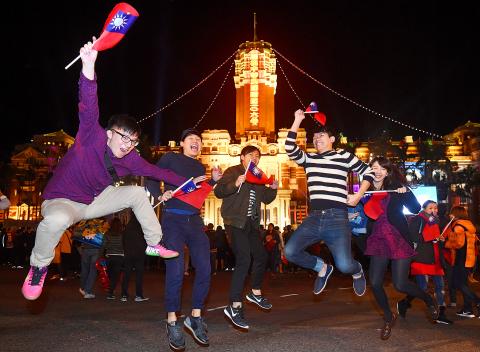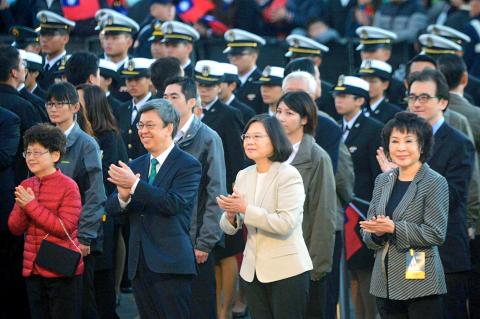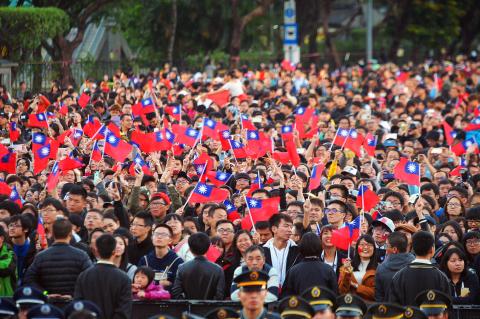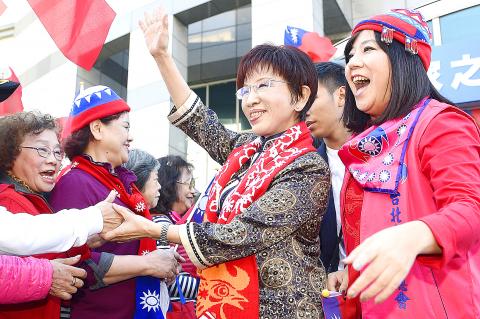In a break with precedent, President Tsai Ing-wen (蔡英文) did not give a New Year’s Day speech yesterday morning, instead marking the occasion by attending a flag-raising ceremony and singing the national anthem along with members of the military.
Tsai and Vice President Chen Chien-jen (陳建仁) left the Presidential Office Building at 6:16am to join the hundreds of people already gathered in front to watch the New Year’s Day flag-raising ceremony, a tradition that has now been observed by four presidents.
As the flag was raised, Tsai and Chen sang the national anthem along with the crowd and 45 soldiers from various units of the armed forces who recently received commendations for their distinguished performances over the past year.

Photo: Liao Chen-huei, Taipei Times
The ceremony was followed by a performance by a group of drummers made up of the Ministry of National Defense Symphony Orchestra and an indie band called Fire Ex, best known for writing a song for the Sunflower movement in 2014.
In past years, following the ceremony, top officials have gathered indoors to hear a speech by the president.
However, this year Tsai set out key areas of policy focus and expressed her hopes for the new year at a news conference on New Year’s Eve.

Photo: CNA
Tsai was celebrating her first New Year’s Day as president.
Former president Ma Ying-jeou (馬英九) attended the ceremony, saying he was there in an informal capacity.
He sang the national anthem and saluted the flag in a spot far from where Tsai and other officials, including Taipei Mayor Ko Wen-je (柯文哲), were standing.

Photo: CNA
Chinese Nationalist Party (KMT) Chairwoman Hung Hsiu-chu (洪秀柱) accepted an invitation to attend the event, but also stood far way from Tsai.
Hung, along with KMT vice chairmen Hau Lung-bin (郝龍斌), Chen Chen-hsiang (陳鎮湘) and Lin Jung-tzer (林政則), later attended a separate flag-raising event held by the KMT in front of its party headquarters in Taipei.
In a speech, Hung said that she “refuses to stand with a government that disregards the law and the Constitution, simply borrowing the shell of a government to take office.”

Photo: Chen Chih-chu, Taipei Times
The sight of a Republic of China flag being raised moves her deeply, she said, adding that the nation has seen both great hardships and prosperity in its 106 years of existence.
“What pains me is that the nation is facing this kind of situation. We apologize to this flag, truly apologize to this flag that has created the Republic of China,” Hung said.
Noting that the word “hardship” was chosen by the public as the word to represent last year, Hung said that the KMT also experienced the hardship of two successive failures.
“We felt distraught and at a loss for morale. We did not know how to face the situation,” Hung said, alluding to the KMT’s failure in the presidential election and its loss of majority in the Legislative Yuan.
Hung said that the KMT was working “for the public” and that it would work toward peaceful relations with China, adding that the party would fight against the government’s proposed lifting of a ban on imports of food products from five Japanese prefectures and would strictly supervise Tsai’s administration.

US President Donald Trump yesterday announced sweeping "reciprocal tariffs" on US trading partners, including a 32 percent tax on goods from Taiwan that is set to take effect on Wednesday. At a Rose Garden event, Trump declared a 10 percent baseline tax on imports from all countries, with the White House saying it would take effect on Saturday. Countries with larger trade surpluses with the US would face higher duties beginning on Wednesday, including Taiwan (32 percent), China (34 percent), Japan (24 percent), South Korea (25 percent), Vietnam (46 percent) and Thailand (36 percent). Canada and Mexico, the two largest US trading

AIR SUPPORT: The Ministry of National Defense thanked the US for the delivery, adding that it was an indicator of the White House’s commitment to the Taiwan Relations Act Deputy Minister of National Defense Po Horng-huei (柏鴻輝) and Representative to the US Alexander Yui on Friday attended a delivery ceremony for the first of Taiwan’s long-awaited 66 F-16C/D Block 70 jets at a Lockheed Martin Corp factory in Greenville, South Carolina. “We are so proud to be the global home of the F-16 and to support Taiwan’s air defense capabilities,” US Representative William Timmons wrote on X, alongside a photograph of Taiwanese and US officials at the event. The F-16C/D Block 70 jets Taiwan ordered have the same capabilities as aircraft that had been upgraded to F-16Vs. The batch of Lockheed Martin

GRIDLOCK: The National Fire Agency’s Special Search and Rescue team is on standby to travel to the countries to help out with the rescue effort A powerful earthquake rocked Myanmar and neighboring Thailand yesterday, killing at least three people in Bangkok and burying dozens when a high-rise building under construction collapsed. Footage shared on social media from Myanmar’s second-largest city showed widespread destruction, raising fears that many were trapped under the rubble or killed. The magnitude 7.7 earthquake, with an epicenter near Mandalay in Myanmar, struck at midday and was followed by a strong magnitude 6.4 aftershock. The extent of death, injury and destruction — especially in Myanmar, which is embroiled in a civil war and where information is tightly controlled at the best of times —

China's military today said it began joint army, navy and rocket force exercises around Taiwan to "serve as a stern warning and powerful deterrent against Taiwanese independence," calling President William Lai (賴清德) a "parasite." The exercises come after Lai called Beijing a "foreign hostile force" last month. More than 10 Chinese military ships approached close to Taiwan's 24 nautical mile (44.4km) contiguous zone this morning and Taiwan sent its own warships to respond, two senior Taiwanese officials said. Taiwan has not yet detected any live fire by the Chinese military so far, one of the officials said. The drills took place after US Secretary